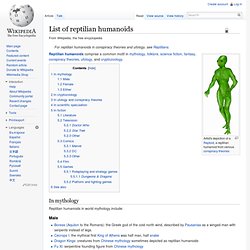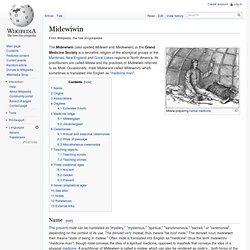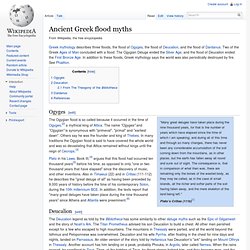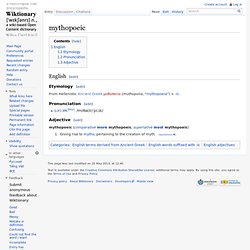

List of reptilian humanoids. Reptilian humanoids comprise a common motif in mythology, folklore, science fiction, fantasy, conspiracy theories, ufology, and cryptozoology.

In mythology Reptilian humanoids in world mythology include: Male Female. Φοῖνιξ. Ancient Greek[edit] Etymology[edit] The etymology surrounding all senses remains somewhat unclear.

The fact that the dye came exclusively from Phoenicia assures some connection. However, it is unclear if it comes from native Greek or is a Phoenician loanword. The relationship in the sense of 'mythical bird' and Egyptian bjnw (“phoenix”) is clear, but some have argued for a Semitic source (possibly Phoenician), perhaps related to the "dye" sense and the bird's red plumage.
Pronunciation[edit] (5th BC Attic): IPA: /pʰó͜ɪnikʰs/(1st BC Egyptian): IPA: /pʰýːnikʰs/(4th AD Koine): IPA: /ɸýnixs/(10th AD Byzantine): IPA: /fýniks/(15th AD Constantinopolitan): IPA: /fíniks/ Noun[edit] φοῖνιξ • (phoiniks) (genitive φοίνικος) m, third declension purple or crimsonpalm treedate (the fruit of the date palm)phoenix, the mythical bird derived from Egyptian mythologyA guitar-like instrument invented by the Phoenicians.
Midewiwin. The Midewiwin (also spelled Midewin and Medewiwin) or the Grand Medicine Society is a secretive religion of the aboriginal groups of the Maritimes, New England and Great Lakes regions in North America.

Its practitioners are called Midew and the practices of Midewiwin referred to as Mide. Occasionally, male Midew are called Midewinini, which sometimes is translated into English as "medicine man". Name[edit] The preverb mide can be translated as "mystery," "mysterious," "spiritual," "sanctimonious," "sacred," or "ceremonial", depending on the context of its use. The derived verb midewi, thus means "be in/of mide. " Due to the body-part medial de' meaning "heart" in the Anishinaabe language, "Midewiwin" is sometimes translated as "The Way of the Heart Origins[edit] "In the beginning, Gichi Manidoo made the mide manidoog. "Gichi Manidoo then went to the Sun Spirit and asked him to go to the earth and instruct the people as had been decided upon by the council.
Associations[edit] Weaving (mythology) Category:Comparative mythology. Ancient Greek flood myths. Greek mythology describes three floods, the flood of Ogyges, the flood of Deucalion, and the flood of Dardanus.

Two of the Greek Ages of Man concluded with a flood: The Ogygian Deluge ended the Silver Age, and the flood of Deucalion ended the First Bronze Age. In addition to these floods, Greek mythology says the world was also periodically destroyed by fire. See Phaëton. Ogyges[edit] Deucalion[edit] From The Theogony of the Bibliotheca[edit] According to the Theogony of the Bibliotheca, Prometheus moulded men out of water and earth and gave them fire which, unknown to Zeus, he had hidden in a stalk of fennel.
Prometheus had a son Deucalion. At the bidding of Zeus he took up stones and threw them over his head, and the stones Deucalion threw became men, and the stones Pyrrha threw became women. Aeolus reigned over the regions about Thessaly and named the inhabitants Aeolians. Category:Legendary progenitors. Category:Primordial teachers. Category:Mythological archetypes. Mythopoeic. English[edit] Etymology[edit] From Hellenistic Ancient Greek μυθοποιία (muthopoiia, “mythopoeia”) + -ic.

Pronunciation[edit] (UK) IPA(key): /mɪθə(ʊ)ˈpiːɪk/ Adjective[edit] mythopoeic (comparative more mythopoeic, superlative most mythopoeic)